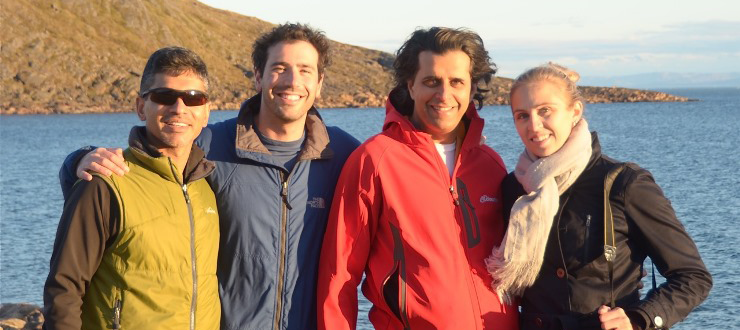
Physicians such as Drs. Sony Singh (left), Dan Margel, Hassan Shenassa and Kristina Arendas travel to Nunavut to see patients in their communities so they don’t have to come to Ottawa.
An interesting adventure: that’s what Dr. Alison Dugan envisioned when she first went to Nunavut for a week 10 years ago to offer care on behalf of The Ottawa Hospital.
Instead, she found the work difficult: she couldn’t reconcile the impact of southern-Canadian culture, like the rise in diabetes due to an increasingly southern diet.
“Then I realized I had a choice to do something about it,” explained Dr. Dugan, the hospital’s physician liaison with the Nunavut government. “My goal is to make it possible for people to get good care without having to leave home.”
Now, she’s proud of the difference she and her colleagues make. Each year, 30 to 40 physicians, residents and technicians from about a dozen hospital services travel to Nunavut for a week at a time to see patients – usually in Iqaluit in the 35-bed Qikiqtani General Hospital, but also in more remote communities such as Pangnirtung, Arctic Bay and Resolute.
“I like going there because you meet the people in their own environment,” said Dr. John Mahoney, a urologist who’s been taking residents to Iqaluit for five years. “If we didn’t go, all these people would have to come down to Ottawa to be seen. So we do save the territory about 90 percent of trips.”
Physicians find the work medically interesting – they see diseases and conditions that have remained untreated longer than they would in southern Canada. While in Ottawa, the physicians provide advice when needed to Iqaluit family doctors.
Dr. Craig Campbell and Dr. Sony Singh lead a team of gynecologists and residents who see 150 to 200 gynecology patients each week they go to Iqaluit.
“We both are very passionate about the north,” said Dr. Singh, who is fascinated by the complex communications challenges. Taking a medical history, for example, requires extra time and pointed questions, given cultural issues around talking about heavy bleeding and incontinence.
Robert Chatelain, CT Charge Technologist, was part of a radiology team that helped set up a new CT scanner in the Qikiqtani hospital 18 months ago, greatly expanding diagnostic abilities. Images are sent to Ottawa via satellite-based internet for reading by radiologists. Chatelain still supports the Qikiqtani radiology manager with quality control and protocols.
The hospital’s telemedicine program offers 54 clinical services to patients throughout Nunavut, saving them time and money and decreasing their stress.
“They’re more compliant with care because it’s easier for them,” said Anca Anghel, Telemedicine Nurse. “We really strive to make the patient’s experience the same as if they came here and, in many cases, it’s better because it’s familiar.”
Hospital-Nunavut partnership brings success stories
Instead of sending Nunavut patients to Ottawa for sleep studies, where their sleep likely wouldn’t be good anyhow, Dr. Judith Leech and Dr. Alison Dugan took the CPAP machines up north. After educating patients, they sent them home to sleep. All that needs to be sent to Ottawa is the microchip; Dr. Leech interprets the data and then recommends settings for the CPAP machines. “It saves so much money, is super convenient for patients, and offers a more representative study,” said Dr. Dugan.
A palliative cancer patient could not be moved home to Nunavut from Ottawa, so the telemedicine team arranged a teleconference with 20 members of his family. “They sang songs and said their goodbyes,” recalled Veronika Uriev, Telemedicine Nurse. “The kids read poems. He passed away not too long after.”

Support patient care and research at
The Ottawa Hospital


 To reset, hold the Ctrl key, then press 0.
To reset, hold the Ctrl key, then press 0.